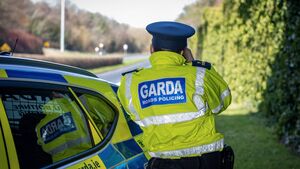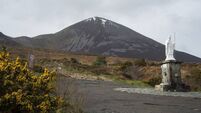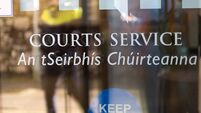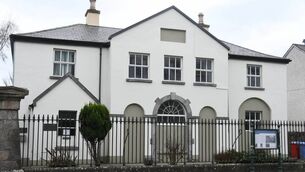A message for our leaders: Window dressing solves little

A Garda performing speed checks as part of last Tuesday's National 'Slow Down' Day.
Government reaction to the horrific deaths on Irish roads in recent weeks, and to incidents of thuggery on the streets of central Dublin, indicated starkly just how ineffective and starved of good leadership this three-party administration is, as it meanders its way to the next General Election.
Irish politicians who are in charge of running the country – to distinguish them from those in opposition – have, in the past two or three decades, failed to deal with major problems in society in any decisive and meaningful way. What I call window dressing and public relations were the preferred responses.
A number of weeks ago an unfortunate visitor to Dublin was seriously assaulted. Within hours the Justice Minister, Helen McEntee was on the airwaves, declaring the streets of Dublin to be safe, and shortly afterwards was photographed in newspapers visiting a Garda station near where the assault took place.
This led to claims and counter claims about how safe, or unsafe, the streets were. And, typical of these situations in Ireland, Dublin business people rowed in with their concerns about anti-social behaviour, intimidation of staff and thieving from businesses.
The Government then sprang to life and announced a €10 million plan for policing in the centre of Dublin. At the launch of the plan the Garda Commissioner, Drew Harris, did a McEntee on it, and said violent attacks in Dublin had not increased, despite narrative to the contrary, and Dublin city centre was safer than other European cities.
All is not lost, however, because the €10 million additional allocation will be spent on Garda overtime. There will be greater Garda visibility on the streets, and there will be increased use of Garda search powers. There will be more targeted surveillance and a focus on the congregation of large groups of people who are perceived to be engaging in anti-social behaviour.
Gardai will also receive support from regional and national resources, including the Garda Air Support, the Garda Mounted Unit and the Garda Dog Unit.
Will all the wringing of hands and the announcement of the big plan make a difference? I doubt it because the plan, the action and the public relations effort, all came about because of a serious incident and bad publicity, including an advisory from the American embassy that their citizens should exercise good personal security practices and avoid walking alone, especially at night.
The dogs in the street knew there were serious problems in city centre Dublin; nothing was done about those problems, or about the people responsible for them, until all the bad publicity made the politicians nervous. And then, in typical fashion, they avoided a crackdown, and a plan of action to take the gurriers off the streets. There was no mention of it, not even a hint that decisive action would be taken.
The second big issue that got the typical Irish Government response was the big increase in the number of deaths on our roads, and the recent horrific crashes that claimed so many lives. There have been 127 deaths on Irish roads so far this year, which is 23 more than the same period in 2022, and 38 more than the same period in 2019.
It was natural that so many people, including political leaders, should express annoyance and dismay that the figures are increasing after years of a steady decline. There were the usual calls for a greater Garda presence, for better enforcement of speed limits and, even, for a reduction of speed limits on country roads.
A National Slow Down Day was announced. A big number of speed checks were organised all over the country, and resulted in a big number of drivers being ‘caught’, some travelling at horrific speeds. It was announced, too, that a special allocation of funds had been made to facilitate an increase of 20 per cent in the number of speed detection vans on Irish roads.
It was disclosed that new measures are being considered to deter speeding. These include more penalty points for repeat offenders and increased fines. In other words, more of the same.
Not mentioned, of course, was a plan to put a fleet of unmarked Garda cars on the roads to detect, not just speeding motorists, but others who drive recklessly and dangerously. My experience, especially in mornings, when people are going to work, is that this type of crazy driving is very prevalent.
Window dressing, which the Government does so well, solves very little.




